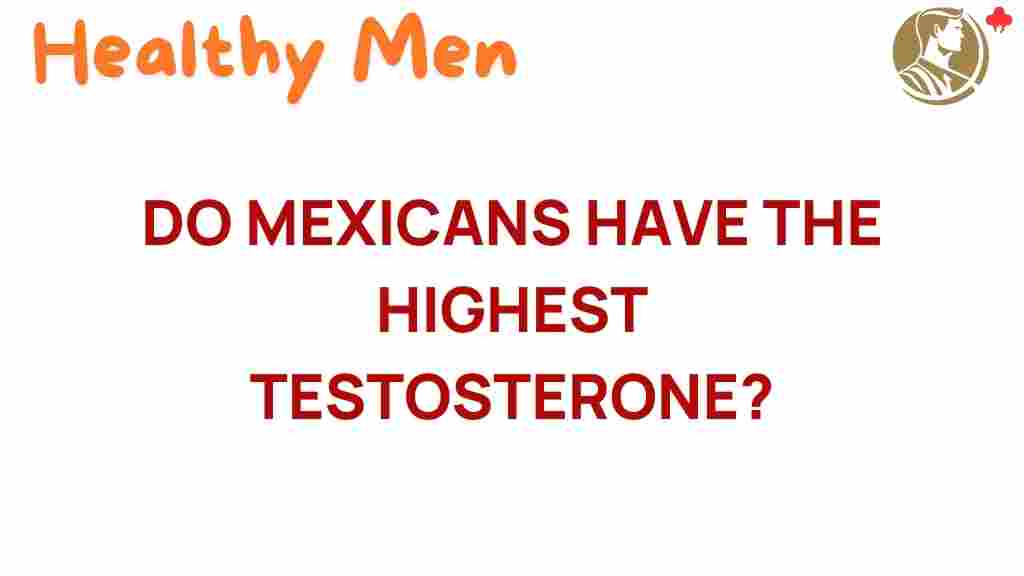Unraveling Testosterone Levels: Do Mexicans Lead the Pack?
Testosterone is often referred to as the primary male sex hormone, but its importance extends beyond gender. Understanding testosterone levels is crucial for overall health, fitness, and well-being. Recent discussions have emerged around the testosterone levels among different ethnicities, particularly focusing on Mexicans. This article aims to explore testosterone levels among Mexicans, examining the biological, cultural, and lifestyle factors that contribute to these hormone levels. We will analyze demographics, health implications, and provide insights into how these factors interconnect.
Understanding Testosterone and Its Significance
Testosterone is a steroid hormone produced primarily in the testes in males and the ovaries in females, with smaller amounts produced by the adrenal glands. This hormone plays a vital role in various bodily functions, including:
- Regulating sex drive (libido)
- Promoting muscle mass and strength
- Maintaining bone density
- Supporting fat distribution
- Influencing mood and energy levels
Low testosterone levels can lead to a range of health issues, including fatigue, depression, reduced muscle mass, and diminished libido. Conversely, excessively high testosterone can lead to aggressive behavior and health problems. Thus, maintaining balanced hormone levels is critical for overall health.
The Biological Perspective: Testosterone Levels Among Ethnicities
Research indicates that testosterone levels can vary significantly among different ethnic groups due to a combination of genetic, environmental, and lifestyle factors. Studies have shown that men of different ethnicities often exhibit varying average testosterone levels, which can influence their health and fitness outcomes.
When it comes to Mexicans, the average testosterone levels are noteworthy. Men of Mexican descent tend to have higher testosterone levels compared to some other ethnic groups, which may be attributed to both biological and environmental factors.
Biological Factors Influencing Testosterone Levels
Several biological factors can influence testosterone levels in Mexican men:
- Genetics: Genetic predispositions can determine hormone production and regulation.
- Age: Testosterone levels typically peak in young adulthood and gradually decline with age.
- Body Composition: Higher levels of body fat can lead to lower testosterone production.
Cultural Factors and Testosterone Levels
Cultural practices and societal norms can also impact testosterone levels among Mexicans. The following cultural factors are noteworthy:
- Diet: Traditional Mexican diets rich in protein and healthy fats may support higher testosterone levels.
- Physical Activity: Cultural emphasis on physical fitness and sports can enhance testosterone through regular exercise.
- Social Structures: Machismo culture may encourage behaviors that promote higher testosterone levels, including assertiveness and competitiveness.
Lifestyle Factors Affecting Hormone Levels
In addition to biological and cultural influences, lifestyle choices play a significant role in determining testosterone levels. Key lifestyle factors include:
- Exercise and Fitness: Regular physical activity, particularly strength training, can boost testosterone levels.
- Diet: Nutrient-rich diets that include zinc, vitamin D, and healthy fats are essential for hormone production.
- Sleep: Quality sleep is crucial for maintaining hormonal balance.
- Stress Management: High stress can lead to elevated cortisol levels, which negatively affect testosterone.
Fitness and Testosterone: A Closer Look
Fitness and exercise are critical components in maintaining healthy testosterone levels. Here are some effective strategies:
- Strength Training: Engaging in weightlifting or resistance training has been shown to significantly increase testosterone levels.
- Interval Training: High-intensity interval training (HIIT) can provide a boost to testosterone due to its intensity and metabolic demands.
- Consistency: Regular exercise, rather than sporadic workouts, is essential for maintaining elevated testosterone levels.
Demographics and Testosterone Levels
Understanding the demographics of testosterone levels among Mexicans requires looking at various factors:
- Age Distribution: Younger populations may show higher testosterone levels compared to older adults.
- Socioeconomic Status: Access to healthcare and nutrition can influence testosterone levels across different socioeconomic groups.
- Urban vs. Rural Living: Lifestyle differences between urban and rural populations can lead to variations in testosterone levels.
Health Implications of Testosterone Levels
Testosterone levels can significantly impact health outcomes. Here are some health implications associated with low and high testosterone levels:
- Low Testosterone: Can lead to decreased libido, fatigue, depression, and loss of muscle mass.
- High Testosterone: May result in aggressive behavior, acne, and increased risk of cardiovascular issues.
It’s essential for individuals to monitor their hormone levels and seek medical advice if they suspect imbalances. Regular check-ups and blood tests can help maintain healthy levels.
Troubleshooting Low Testosterone Levels
If you suspect low testosterone levels, consider the following steps:
- Consult a Healthcare Professional: Get a comprehensive evaluation and blood tests to measure hormone levels.
- Review Lifestyle Choices: Assess your diet, exercise habits, and sleep patterns.
- Consider Dietary Adjustments: Increase intake of zinc-rich foods, lean proteins, and healthy fats.
- Incorporate Exercise: Engage in regular strength training and cardiovascular activities.
- Manage Stress: Practice mindfulness, meditation, or yoga to reduce stress levels.
Conclusion
In conclusion, testosterone levels among Mexicans can be influenced by a myriad of factors, including biology, culture, and lifestyle choices. Understanding these influences can help individuals make informed decisions about their health and fitness. Maintaining balanced testosterone levels is vital for overall well-being, and by embracing healthy habits, individuals can optimize their hormone levels. Whether through diet, exercise, or lifestyle changes, promoting healthy testosterone levels is a worthwhile pursuit.
For further information on maintaining hormone health, you can visit this comprehensive guide. Additionally, if you’re looking to understand more about fitness and testosterone, check out this resource for tips and strategies.
This article is in the category Conditions and created by healthymen Team
